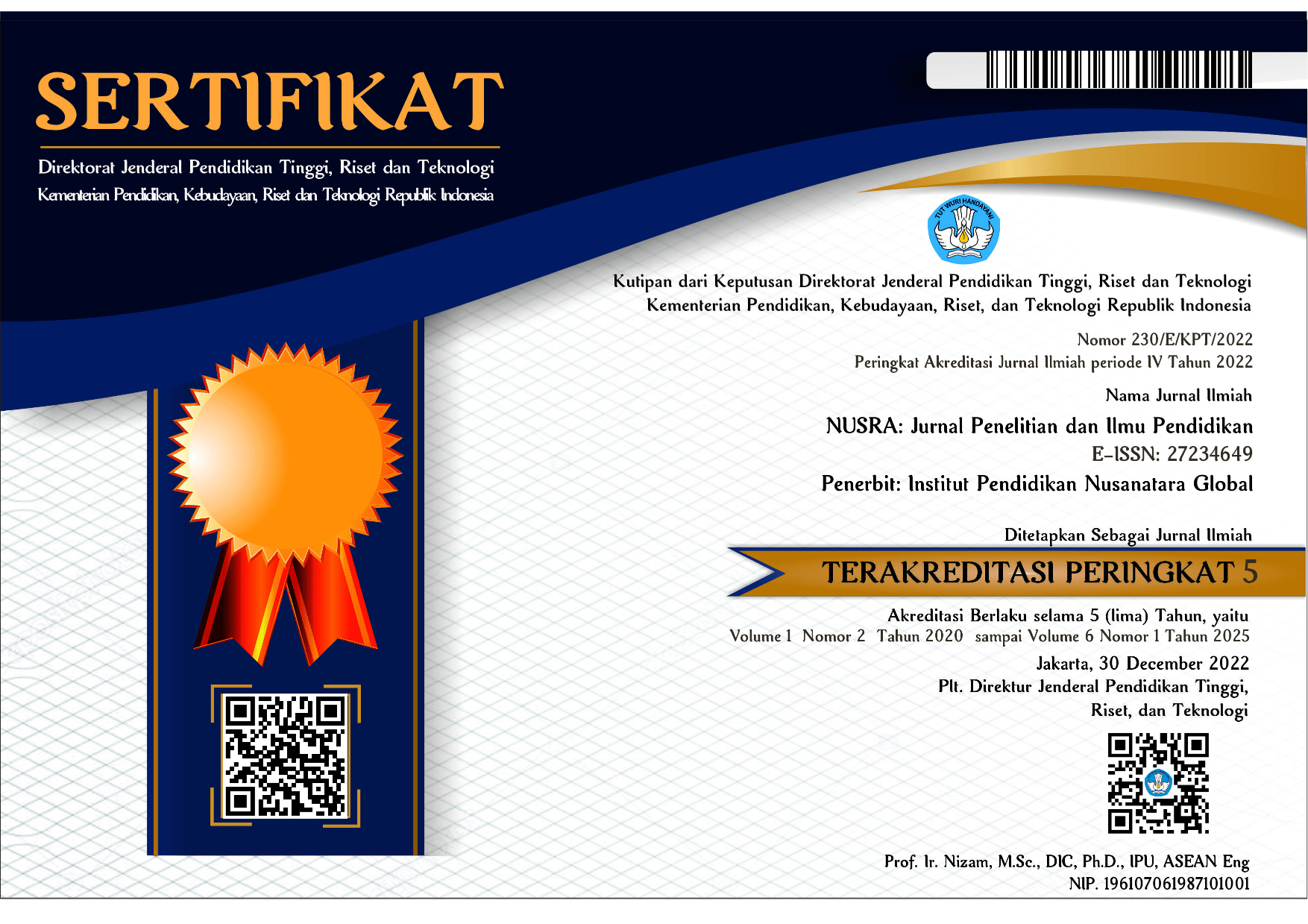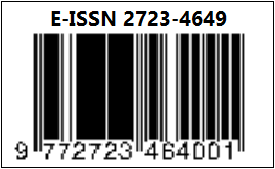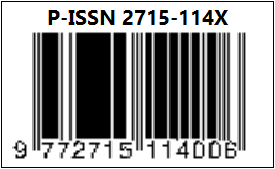Studi Komparatif Model Problem Based Learning (PBL) dan Model Talking Stick Terhadap Peningkatan Keterampilan Berbicara Siswa SDN Pembina Tolitoli
DOI:
https://doi.org/10.55681/nusra.v5i4.3240Keywords:
Problem Based Learning, Talking stick, Speaking SkillsAbstract
This study was conducted to identify the differences between classes that implement the Problem Based Learning (PBL) model and classes that implement the Talking Stick model. The purpose of this study was to determine the description of the application of the Problem Based model and the application of the Talking Stick model of students at SDN Pembina Tolitoli, to determine the description of the speaking skills of students at SDN Pembina Tolitoli, to determine whether the Problem Based Learning (PBL) model and the Talking Stick model have a significant effect on improving the speaking skills of students at SDN Pembina Tolitoli, and to determine the differences in comparative results between the Problem Based Learning (PBL) model and the Talking Stick model on improving the speaking skills of students at SDN Pembina Tolitoli. The type of research used in this study is quantitative research using the pre-experimental design method with a one-shot case study design, which was carried out on students at SDN Pembina Tolitoli with a total population of 633 students. The research sample consisted of three classes, namely class VA with 30 students, class VB with 29 students, and class VC with 29 students, which were selected using purposive sampling. Data collection was done through observation and testing, and data analysis using SPSS 25 software. The results of the study showed that the significance value of the Problem Based Learning (PBL) model was 0.212> 0.05 and the Talking Stick model was 0.000 <0.05. Thus, there is a significant influence where, Fcount> Ftable (41.765> 4.88) it can be concluded that Ha is accepted and H0 is rejected which means that the independent variable affects the dependent variable.
Downloads
References
Alika K, H., Andriany, J., Oktavia, S., Agustina, R., Nursusanti, A., & Wahyuni, A. (2023). Meretas filsafat pendidikan materialisme-naturalisme dalam konteks pendidikan dasar. Madako Elementary School, 2(1), 48–61.
Ampry, E. S., Arsiah, Fatwa, M. F., A.M, M. I., & Arifuddin. (2022). Supervisi kepala sekolah terhadap kinerja guru sekolah dasar. Madako Elementary School, 1(2), 176–186.
Barokah, A. R., & Kamal, R. (2023). Implementasi sekolah adiwiyata terhadap pembentukan karakter kedisiplinan dan entrepreneurship siswa di MI Salafiyah Tanjung. Madako Elementary School, 2(2), 181–189.
Fatzuarni, M. (2022). Pentingnya evaluasi dalam proses pembelajaran. Pendidikan Bahasa Dan Sastra Indonesia, 1–10.
Hamna, & BK, M. K. U. (2022). Dilematism: Principal’s Managerial Strategies in Realizing the Covid-19 Vaccination Program in Elementary School. Jurnal Madako Education, 8(1), 70–79.
Hamna, H., BK, M. K. U., Aisyah, N., Muhajir, Kartika, & M, A. G. (2024). Peran Bahasa Indonesia sebagai Alat Komunikasi dalam Kehidupan Sosial Bermasyarakat Desa Lakatang. PROFICIO, 5(2), 105–110.
Idris, I., Hasjaya, A., M, S., Maryam, A., & Ahmad, R. E. (2022). Pengaruh Model Problem Based Learning Berbantuan Zoom Meeting Terhadap Hasil Belajar Siswa. Madako Elementary School, 1(2), 151–162.
Kartika, K., BK, M. K. U., & Rudini, M. (2024). Model discovery learning dengan menggunakan media konkret dalam meningkatkan numerasi siswa pada pembelajaran matematika di sekolah dasar. Jurnal Basecedu, 8(4), 2926–2940.
Khasana, A., Marto, H., & Hamna. (2024). Meningkatkan hasil belajar matematika menggunakan media puzzle berbasis small group learning di 5 tambun. Jurnal Inovasi Global, 2(3), 778–795.
Mardiana, M. (2020). Meningkatkan hasil belajar IPS pokok bahasan mengidentifikasi benua-benua melalui model pembelajaran kooperatif tipe talking stick pada siswa kelas VI SD Negeri 45 Buton semester I tahun pelajaran 2019/2020. Jurnal Akademik, 10(1), 59–67.
Maruti, E. S., & Ananta, I. (2024). Cyberbullying among elementary school students on tiktok social media platform. Madako Elementary School, 3(1), 55–67.
Millatu Zulfa, Hidayatu Munawarah, & Sofan Rizqi. (2023). Upaya pengenalan budaya lokal batik untuk meningkatkan kreativitas siswa madrasah ibtidaiyah pekalongan. Madako Elementary School, 2(1), 62–84.
Muttaqien, N., & Awiria. (2022). Peningkatan kemampuan berbicara bahasa inggris siswa madrasyah ibtidaiyah melalui teknik pembelajaran picture and picture. Jurnal Madako Elementary School, 1(2), 68–77.
Nadila, N., Widiastuti, S., & Fauzi, A. (2023). Pengembangan buku ajar ide pokok berbasis potensi lokal Pantai Tambakrejo : Model kooperatif scramble di SD. Madako Elementary School, 2(2), 110–120.
Nashan, S., Anisa, R. N., Ummah, N., Margaretha, S. M., & Fitryah, A. (2023). Analisis perbedaan pencapaian hasil belajar siswa dengan menggunakan metode PBL kelas V di SD 2 Bulong Kulon. Implementasi Projek Penguatan Pelajar Pancasila (P5) Dalam Kurikulum Di Sekolah Dasar, 2(1), 753–760.
Ndolu, S., & Tari, E. (2022). Problem-based learning model according to matthew 14:13-21. Jurnal Pendidikan Agama Kristen (Jupak), 2(2), 86–98.
Purwasih, W., & Sahnan, A. (2022). Peningkatan Mutu Lembaga Pendidikan Dasar Melalui Manajemen Sarana dan Prasarana. Madako Elementary School, 1(2), 99–117.
Supriyati, I. (2020). Penerapan metode diskusi dalam pembelajaran keterampilan berbicara pada siswa kelas VIII MTSN 4 Palu. Jurnal Bahasa Dan Sastra, 5(1), 104–116.
Utamajaya, J. N., Manullang, S. O., Mursidi, A., Noviandari, H., & BK, M. K. U. (2020). Investigating the teaching models, strategies and technological innovations for classroom learning after school reopening. Palarch’s Journal Of Archaeology Of Egypt/Egyptology, 17(7), 13141–13150.
Downloads
Published
How to Cite
Issue
Section
License
Copyright (c) 2024 Fitriani Abd Rahim, Muh. Khaerul Ummah BK, Hasia Marto

This work is licensed under a Creative Commons Attribution-ShareAlike 4.0 International License.














